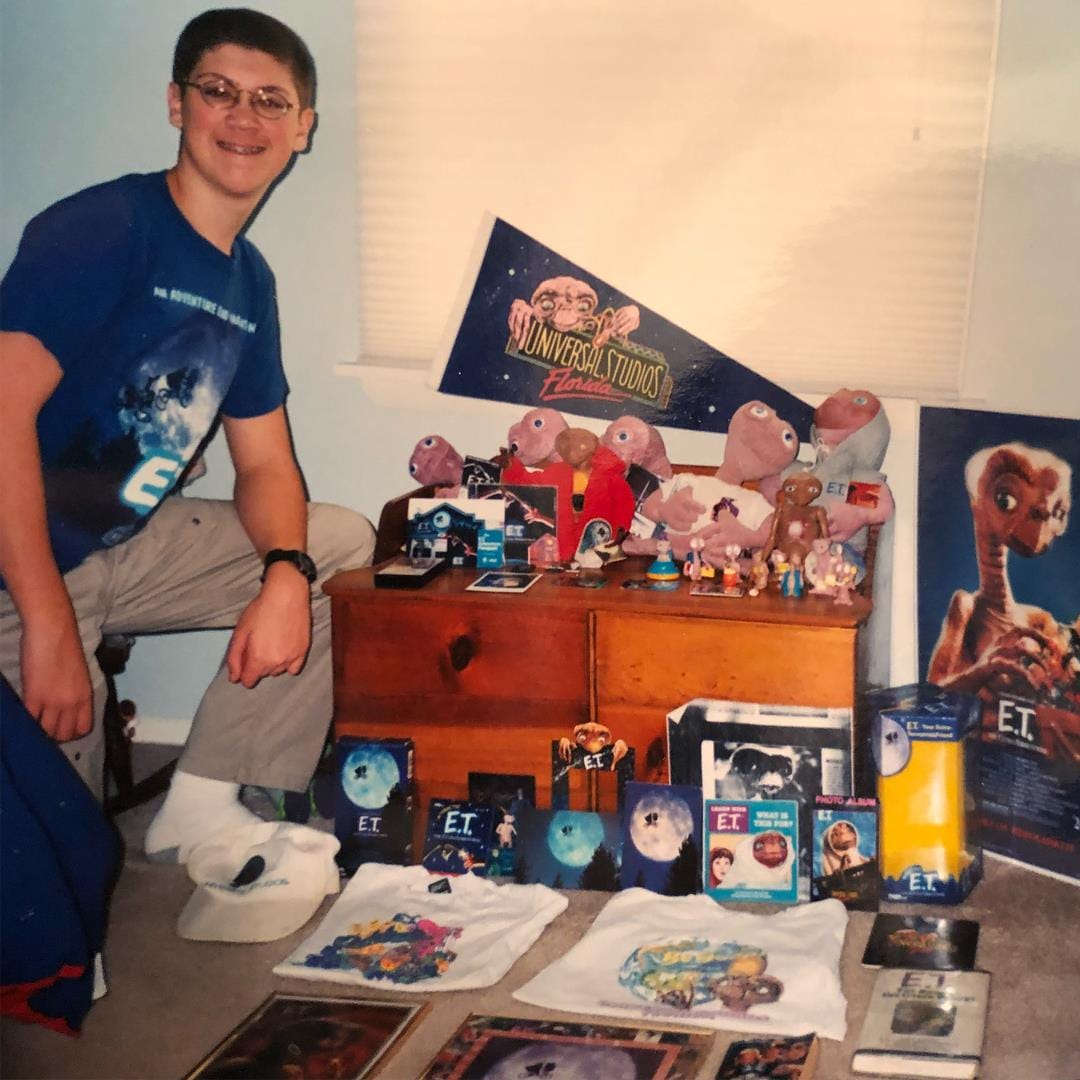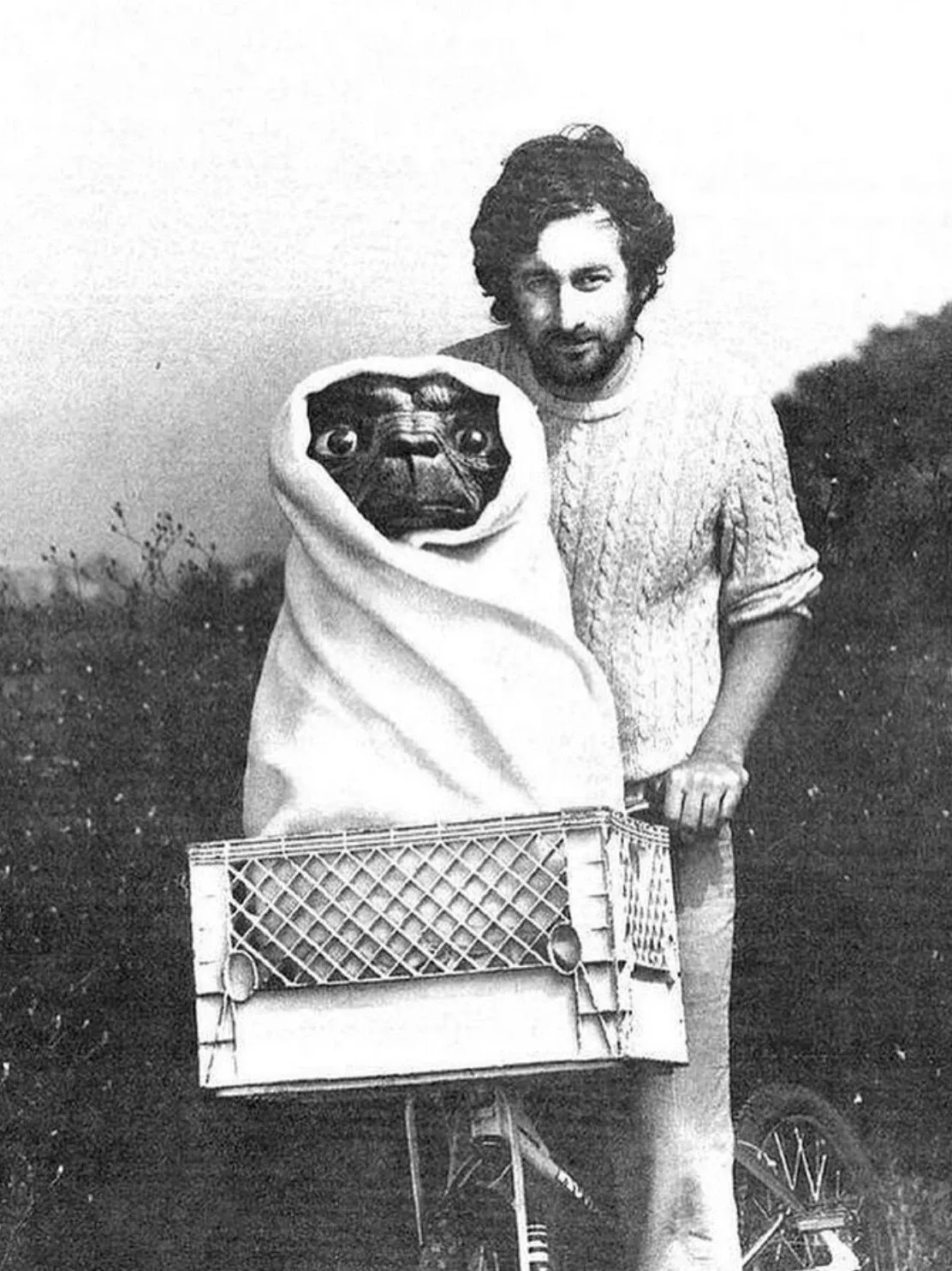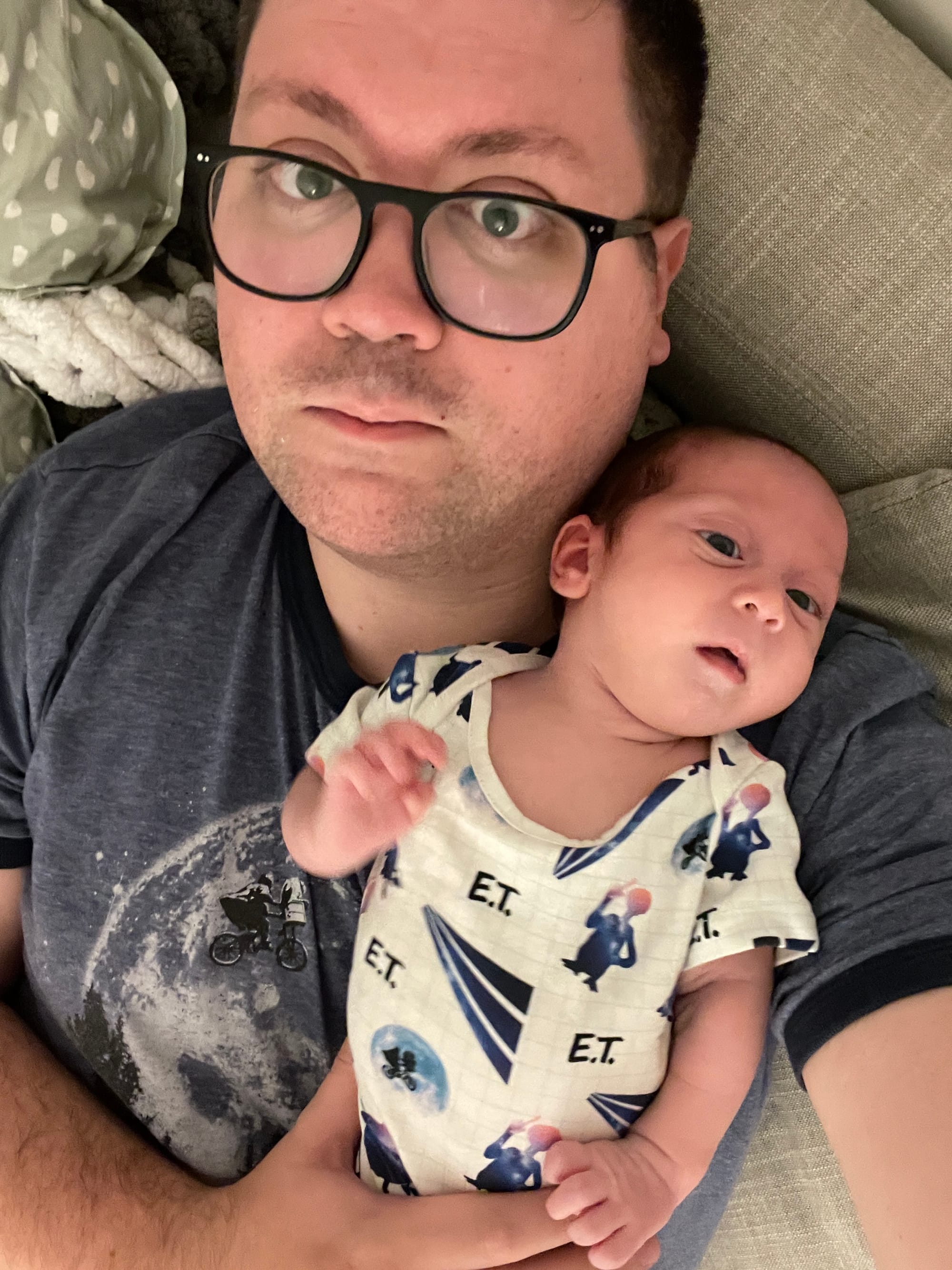From the Archive: An Extra-Terrestrial Questionnaire
An unpublished self-interview from 2022 about E.T. THE EXTRA-TERRESTRIAL, my favorite film.

2022 was a delightful year to be an E.T. fan: the film's 40th anniversary was celebrated with a considerable but tasteful marketing push, and unlike the anniversary re-release two decades before (sullied in part by a new version of the film with needless CGI enhancements), it really felt like people were ready to engage with the movie where it was. For me, I got some incredible experiences out of the time: I enjoyed Caseen Gaines' terrific making-of book, I got to see a principal cast reunion at a taping of The Drew Barrymore Show, and I met much of that cast at the Chiller Theatre Expo in New Jersey later that month. Oh yeah: and I got to write the liner notes to Mondo's 40th anniversary vinyl reissue of the Oscar-winning soundtrack - my favorite music recording ever.
That same year, I was asked to take part in a virtual roundtable of sorts on the film for the long-running film/home media website The Digital Bits - part of their ongoing series called "History, Legacy and Showmanship." Gaines was interviewed, of course, along with my friend and colleague Mike Matessino (a longtime soundtrack archivist who's long been the primary producer of John Williams' classic scores for CD and vinyl), some notable authors of Steven Spielberg books (biographer Joseph McBride, historian Steven Awalt) and a host of documentarians and random film people. Sadly, not a single word of my answers to the questions was used - mostly a shame because it was one of my first times really trying to sit and put into words how I see this movie, even after telling or telegraphing to virtually everyone I know that it's my favorite of all time.
For the film's 42nd anniversary, I figured it was a good time to dust off these answers and present them to you - an opportunity for you to learn something about my taste in art, or a chance to inspire you to enjoy this film yourself.

How do you think E.T. ought to be remembered on its 40th anniversary?
For me, there’s only one way to remember E.T. The Extra-Terrestrial on any anniversary, holiday or cause for viewing: as my personal pick for the most satisfying cinematic experience one could ask for. From the first frames to the last credit, E.T. keeps me hooked with its powerful tale of love and whimsy; I’m delighted at the idea of more people falling for its charms, 40 years after it first shook the world.
A video release with a trailer! Imagine that.
What was your first impression of E.T.?
It was a night in 1989 or 1990 - I don’t remember my brother being born yet, but I could be wrong - that I first discovered the VHS of E.T. in a cupboard in a room in my grandparents’ house in Iselin, NJ. Finding that cassette was like discovering something from another planet; it wasn’t like the puffy clamshell Disney cassettes or home-recorded films with handwritten labels identifying their contents. The deep blue of the sky, the brilliant moon across which…was that a bike? What were those creatures? A boy? Something else?
We popped the tape in and, like so many children, my interest turned to terror as the Panasonic TV blared alien shrieks, clomping agents and a whooshing spaceship over an arresting score. It was some time before I could find myself ready to brave past those first minutes, and it took a very long time to really comprehend even the basic building blocks of the story. But what I could parse even then was the bond between Elliott and E.T. - a trust and respect that needed no explanation. It was the sort of good you looked for in everyone as a child - and if you were lucky, you’d find it offscreen, too.
In what way is E.T. a significant motion picture?
For me, E.T. was a gateway to a generation of entertainment I was just a little too young to experience firsthand. The combination of sweetness and spectacle that defined the films of Steven Spielberg, the music of John Williams, the craft of Industrial Light & Magic - my appreciation for all of it started with E.T., and its movie magic.
As I get older - I’m now married, and thinking of starting a family to show the film to - what really fascinates me is the movie’s simplicity that nonetheless captivated audiences en masse. We live in times where our attention is pulled in every direction by films, television and music that too often attempts to ape the thrills of what once was. That E.T. earned an unprecedented amount of money and attention, but felt wholly original and was not endlessly rehashed in sequels, Saturday morning cartoons or streaming-exclusive reboots, really speaks to its presence as a rare gem in mass entertainment.
To answer the below question.
Do you have a favorite scene or moment in the film?
In every sense, the bike chase and flight near the climax of the movie is flawless to me. The direction, camera work, editing, bike stunts, special effects, and one of Williams’ single most blissful cues in his discography just puts a spontaneous smile on my face and a thrill in my ribcage every single time.
But E.T. possesses power in the small moments, too. Much has been written about Henry Thomas and Drew Barrymore’s powerful performances as Elliott and Gertie, but I want to take a second to highlight Robert MacNaughton as oldest brother Michael. He’s caught in that classic dilemma of all elder siblings - whether to mentor or torment, and how to lead the misfit Elliott, someone who ultimately doesn’t need leadership from him - and Robert has so many great small moments. His corrective of a scientist as they investigate the house (“Elliott thinks its thoughts?” “No, Elliott feels his feelings”) is an unintentionally relevant reminder to respect the identities of all life, and his halting stabs at male intimacy, petting E.T. on the head before the alien enters the spaceship, are tender and appreciated.
The summer of 1982 is remembered for featuring several sci-fi, fantasy and escapism movies. Why was E.T. the most popular of the bunch?
While John Carpenter’s The Thing boasted great special effects and tightly wound tension and Star Trek II: The Wrath of Khan served as a terrific entryway into the adventures of the USS Enterprise, E.T. is aided by its simplicity and accessibility. Peter Coyote, who played the government agent Keys, once opined that if two entities as different as E.T. and Elliott could find common ground, then no two cultures or belief structures could be that far apart, either. Watching, laughing and crying over the relationship at the heart of the movie, you believe (or at least strongly hope) it’s true. And at no point does Carlo Rambaldi’s creature design or Industrial Light and Magic’s flying bikes get in the way of those emotions - they only aid and abet the feelings you’re feeling from the story and the dialogue and the characters.
The setting has a lot to do with it, too. We’re not in deep space or the wilds of the Antarctic, or a grim dystopian L.A. like Blade Runner. Many of us - myself included - grew up on streets like where E.T. took place; we knew those families and those classrooms and those moments huddled around the table playing games with friends. Spielberg’s magic touch, so often, is to set off a megaton bomb of fantasy in the middle of these typical surroundings, and seeing the environment adapt to and inform the magic is part of the fun.

In what way was Spielberg the ideal person to direct this movie, and where do you think E.T. ranks among his body of work?
Steven Spielberg’s movies have made literally billions of dollars, so it’s insane to consider him an underrated craftsman. But if you look at popular film discourse in spaces like Twitter or Letterboxd, it’s craftsmen like Scorsese, Coppola and Welles who get the lion’s share of respect and discussion points. You would be unwise, though, to paint him with the broad brushes he’s sometimes depicted with: a master emotional manipulator who’s somehow empty calories, a too-stylish-by-half craftsman who’s nonetheless responsible for much of the way we process whimsy on screen.
From Mac and Me to Free Willy to Stranger Things, the DNA of E.T. remains present in a lot of entertainment that doesn’t leave you as emotionally raw as this one does. But this isn’t an “eat your vegetables” movie - you can appreciate it on any level of complexity that you wish, and it works like a dream. I loved it when it made me think of happiness and thrills, and I love it when it makes me think of the pain of divorce and the bittersweetness of leaving childhood.
Spielberg’s movies have defined modern blockbusters and action thrill rides. They’ve had things to say about the Holocaust, terrorism, war and racism, with varying degrees of spectacle attached to each story. But that balance of E.T., almost painfully intimate in some places and operatic in others, is the one that speaks to me the most out of a body of work that is never short on things to say.
What do you think is the legacy of E.T.?
It might be fairer at this point to ask me what isn’t the legacy of E.T. at this point, because it really is all things to all people. An intimate friendship story and a hushed personal gambit for Spielberg that nonetheless pushed the boundaries of storytelling craft and financial gain; and yet, a blockbuster that looks and feels like so few of the four-quadrant crowd-pleasers it stands next to.
Ultimately, though, it might always be about what E.T. is to me: a film of uncommon power and beauty that molds the way I see the world. Thanks to Steven Spielberg’s cozy little tale that made the world fall in love with its wayward alien hero, I have sought to live a life led by the heart (glowing or not) above all. That belief in the power of love to make bicycles take flight or lonely souls find a way forward is what I choose to believe in even when it seems like a foolhardy idea. So long as I carry E.T.’s gifts with me, I’ll believe in them all my life. Every day.

